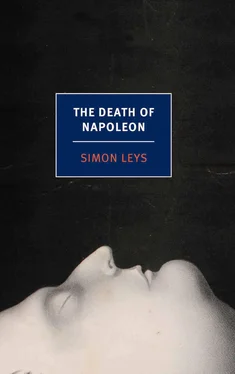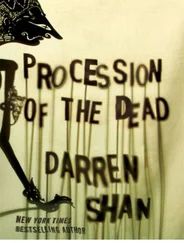The hustle and bustle of the journey surges around Napoleon, who sits rock-like, calm and concentrated. His traveling companions have been busy lighting cigars, striking up conversations, unfolding newspapers, uncorking bottles, peeling hard-boiled eggs, slicing sausages, taking off overcoats, untying scarves, unbuttoning waistcoats, shedding flannel underwear, exchanging confidences, telling bawdy jokes, criticizing the government, and providing physiological details about their state of health. Eventually the cool of the evening has made them progressively button up again. Some are already nodding, their noses buried in their overcoats, while dusk, creeping over the fields, deepens into night.
Impervious to heat and cold, to the pleasures of tobacco and conversation, Napoleon has stuck stoically to his diet of dry bread and daydreams. His imagination is galloping far ahead of the four horses whose hooves monotonously pound the highway for hours on end — toward Paris, toward Paris!
“FLEURUS! Royal Gendarmerie patrol! Passport check!”
Under the light of the coach lamp, in a halo of mist, a gendarme’s busby covered in tiny droplets of rain appears framed in the window. Only his face, red with cold, and the golden glow of the button on his collar stand out in the blackness of the night that has covered the whole countryside like the lid on a cauldron.
The travelers stretch, shake themselves, and shiver, hunching their shoulders under this sudden intrusion of cold and silence. They feel as though they are lost on another planet. The only sounds to be heard are the peaceful breathing of the team of horses, the clinking of a bit, the scraping of a horseshoe.
The gendarme buries his nose in the crumpled papers that have been handed to him. A stubborn smoker lights up his old cigar again, filling the coach with its acrid stench.
“Lenormand, Eugène Lenormand. Which one of you is he?” the gendarme asks, waving a passport in his hand.
The passengers start looking at each other suspiciously.
“Well, where’s Lenormand?” the gendarme repeats, growing impatient.
The inconspicuous passenger in the gray coat suddenly gives a start, like someone who has just woken up. This slight shiver is a sufficient clue for the anxious and surly bourgeois who are traveling with him; in fact, they have identified him even before he can do so himself. “Come on, can’t you hear Monsieur le Gendarme calling you? What are you waiting for?” All these peremptory looks in his direction: they must be right.
“Get down,” says the gendarme. “Follow me.”
His legs are stiff and he has difficulty making his way to the door between two rows of hostile whispering passengers. The gendarme helps him down.
The old coach has started off again. The yellow lamp that dangles on its rear jumps each time it goes over a bump in the road. Then the light disappears, suddenly snuffed out by a bend in the road.
Napoleon allows himself to be led like a blind man to the guardhouse, a cottage by the side of the road, half hidden behind a fence. A dog barks in the dark. His chain can be heard grating against a wooden post.
Inside the guardhouse, two gendarmes are smoking their pipes in front of a cast-iron stove. A sergeant in his shirtsleeves is sitting behind a kitchen table. He looks rather like a balding bailiff. His boots are lying in a corner and he is wearing slippers. The usual pot of geraniums sits on the windowsill. Apart from the smell of tobacco and old socks, the atmosphere in the room, all things considered, is more like a cozy bourgeois interior than a police station.
“Sergeant, we’ve got the man!” the gendarme announces, looking pleased with himself.
The Man! This is what all the crowned heads of Europe used to call him, in fear and trembling, as though the four syllables of his Christian name were a thunderbolt that could topple their thrones at the first distant rumble…
“Eugène Lenormand, wanted for failure to pay a bill. You left the hotel Au Rendezvous des Namurois, at the wooden clock in the rue du Théâtre in Brussels…” The sergeant was reading from a document in front of him, as though giving evidence. He placed his finger on the last word and looked up at the accused. Meanwhile, the gendarme who had detained him went over to the stove and, with a look of utter contentment, stood with the tails of his jacket lifted, warming his back.
The offense was trivial and the offender unimportant. The other gendarmes yawned. Only the sergeant went on looking at Napoleon closely and thoughtfully. The two men stared at each other in silence for quite some time.
“You’ll be taken back to Charleroi tomorrow morning,” the sergeant said at last in his toneless voice. He slipped into the table drawer the offender’s papers, which the gendarme had handed over when he came in. “For tonight, you can put him with Louis,” the sergeant added, turning to the gendarme.
Napoleon had not uttered a single word. The gendarme indicated that he wanted him to follow, and they found themselves once more out in the cold night air. As they walked around the cottage, they passed behind the fence. A big dog bounded out of its kennel, pulling on its chain. It was about to give another series of barks, but at the gendarme’s command growled and curled up in its shelter.
They crossed the vegetable garden and arrived at a sort of outhouse — probably an old toolshed. The gendarme unbolted the door and guided Napoleon inside. In the dark, he pointed out his bed: a bed made of wooden planks on which Napoleon could feel the rough thickness of a folded blanket.
The gendarme went out, and Napoleon heard him put a padlock on the outside.
Napoleon sat down on the bed while his eyes got accustomed to the dark, but he could make out only the vague, pale shape of a tiny skylight above his head.
It was relatively warm in the confined space of the hut, and a faint smell of cattle hung in the air.
He was getting ready to explore the place by groping around in the dark, when he suddenly became aware of an unknown presence in the room. A few yards away, in the opposite corner, there was a noise like a heavy body turning over in its sleep on a bed of straw. The other occupant of the shed kept on tossing about on his straw, exhaling very loudly two or three times like a surfacing whale, then seemed to sink back into the depths of silent sleep.
It must be Louis, Napoleon thought, remembering what the sergeant had said. But who on earth was Louis? A warder or another prisoner? A tramp, a drunk? Or perhaps it wasn’t a man at all but some large animal, an ox, who knows? In this state of uncertainty, he decided to keep quiet, and without making a sound he lay down on the wooden bed. He did not take off his clothes but merely loosened his cravat. He covered himself with the rough blanket and, lying flat on his back, waited for sleep to come.
Sleep did not come. His body was nearly collapsing with fatigue, but his mind, as effervescent as ever, was still burning brightly like a forgotten chandelier in a ruined house.
With his eyes wide open he tried to penetrate the darkness of the hut. Turning his head slightly, he noticed that the dull white of the square window was now more pronounced. Perhaps the moon had risen, or was it frost?
His mind worked feverishly. The hotel bill — what was the stupid place called again? Something to do with Luxembourgeois? — he would pay the hotel bill, and the fine, and anything else he had to. He did not have much money left, but that was not the real problem. What terrified him was the fact that they would want to check his identity, and his rather crudely forged papers would never stand up to any kind of close inspection. What a fate! He had straddled oceans and scaled mountains, only to slip in a puddle of water or stumble over a molehill.
Читать дальше












